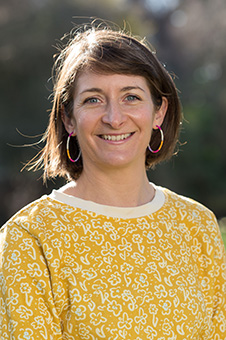A simple blood test to replace the need for colonoscopies in children with inflammatory bowel disease, and potential hope for a new psychological therapy for bipolar disorder – they are two of four University of Otago, Christchurch ( UOC ) research studies awarded Canterbury Medical Research Foundation ( CMRF ) Project Grants for 2023.

Dr Katie Douglas.
This year, for the first time in CMRF ’s 63-year history, all six Project Grant recipients are women – including Dr Katie Douglas, Dr Teagan Edwards, Dr Louise Paton and Dr Catherine Donovan from UOC .
Clinical Psychologist Dr Douglas, from UOC ’s Department of Psychological Medicine, was judged CMRF ’s top applicant for 2023. She will receive $101,777 to support her two-year research project investigating a new psychological treatment for bipolar disorder.
Called Behavioural Activation Therapy, the treatment is commonly used to help people experiencing depression, but new research overseas suggests it could be just as effective at treating bipolar disorder.
The condition affects nearly 2 per cent of all Kiwis, but rates are double for Māori, Dr Douglas says.
“Unfortunately, most people with bipolar disorder cannot access psychological therapy in Canterbury, or throughout New Zealand. Medication can help, but having a qualified therapist to support patients is critical for long-term recovery.
“It’s really disheartening because bipolar disorder is a lifelong condition. It’s chronic and it’s relapsing so there needs to be long-term psychological input for these people to help them manage their condition.”
Twenty people with bipolar disorder will be recruited to take part in the project. They'll receive therapy over a period of six months, with assessments carried out before and after to determine the trial’s success.
Dr Teagan Edwards, a UOC Department of Paediatrics researcher, has been awarded $109,992 to investigate whether a simple blood test could replace the need for more invasive testing in children with inflammatory bowel disease (IBD).
More than 20,000 New Zealanders have IBD , with up to a quarter diagnosed as children or adolescents.
“Typically, when a child presents to their doctor with signs and symptoms of inflammatory bowel disease they’re put through a barrage of tests, including blood and faecal tests, but these don’t always give clinicians a full understanding of what’s going on,” Dr Edwards says.
Colonoscopies are often used to paint a clearer picture, but Dr Edwards believes there could be a less invasive solution.
Her two-year project will assess the suitability of a new blood test that measures the level of myeloperoxidase, an enzyme produced by immune cells, to detect the amount of inflammation happening inside the body.
“If we had a blood test that could accurately reflect disease severity in children with inflammatory bowel disease, we could reduce the number of colonoscopies they require and enable earlier diagnosis and more effective disease monitoring. This ultimately means these children can spend more time out of the hospital and enjoying their childhoods,” Dr Edwards says.
Research Fellow Dr Louise Paton, from the Department of Medicine’s Christchurch Heart Institute (CHI,) has been granted $109,843 to research the link between what we eat, how our body metabolises energy, and heart disease.
“Finding biochemical links between these three things has proven difficult and unfruitful, partly because there are so many potential contributing factors. There’s also a lack of knowledge about which of these factors might modify aspects of acute heart disease,” Dr Paton says.
“Recently, a small metabolite, which comes from a known circulating energy source, was found to reduce feeding and improve exercise capacity in mice, racehorses and humans. This metabolite is formed from an important and prominent source of energy for the heart. What has not been studied is how this metabolite contributes to heart disease. We will therefore extend this initial discovery to see if the amount of this molecule in the blood is related to heart vessel disease and ischaemia and whether it can be used to predict outcomes for those with heart disease.”
Child and Adolescent Psychiatrist Dr Katherine Donovan, from UOC ’s Department of Psychological Medicine, has been granted $109,985 to investigate whether an integrated group treatment could support wellbeing in adolescents impacted by the March 15 Christchurch mosque attacks.
“The mosque attacks have had widespread repercussions in the Muslim and wider community in Christchurch and New Zealand. Our trial will determine the feasibility and effectiveness of this group treatment approach by assessing symptoms of emotional difficulties and functioning at baseline, end of treatment and at follow-up, as well as measuring the acceptability of the project with participants and families.
“We will also measure the distress levels of parents, to explore whether an intervention for adolescents has an impact on parental wellbeing. The results will tell us whether this approach is feasible and easily accessible for adolescents impacted by traumatic events,” Dr Donovan says.
Canterbury Medical Research Foundation Chief Executive Melissa Haberfield says the calibre of this year’s Major Project Grant applicants was extremely high, and the research projects that have been submitted are testament to the exceptional talent of Canterbury researchers.
For further information, please contact:
Lorelei Mason
Communications Adviser, Media Engagement
University of Otago, Christchurch
Mob +64 21 279 2203
Email lorelei.mason@otago.ac.nz
